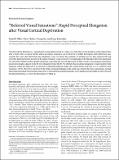| dc.contributor.author | Baker, Chris I. | |
| dc.contributor.author | Dilks, Daniel D. | |
| dc.contributor.author | Yicong, Liu | |
| dc.contributor.author | Kanwisher, Nancy | |
| dc.date.accessioned | 2010-06-28T14:07:29Z | |
| dc.date.available | 2010-06-28T14:07:29Z | |
| dc.date.issued | 2009-07 | |
| dc.date.submitted | 2009-06 | |
| dc.identifier.issn | 1529-2401 | |
| dc.identifier.uri | http://hdl.handle.net/1721.1/55973 | |
| dc.description.abstract | Visual perceptual distortion (i.e., elongation) has been demonstrated in a single case study after several months of cortical deprivation after a stroke. Here we asked whether similar perceptual elongation can be observed in healthy participants after deprivation and, crucially, how soon after deprivation this elongation occurs. To answer this question, we patched one eye, thus noninvasively and reversibly depriving bottom-up input to the region of primary visual cortex (V1) corresponding to the blind spot (BS) in the unpatched eye, and tested whether and how quickly elongation occurs after the onset of deprivation. Within seconds of eye patching, participants perceived rectangles adjacent to the BS to be elongated toward the BS. We attribute this perceptual elongation to rapid receptive field expansion within the deprived V1 as reported in electrophysiological studies after retinal lesions and refer to it as "referred visual sensations" (RVS). This RVS is too fast to be the result of structural changes in the cortex (e.g., the growth of new connections), instead implicating unmasking of preexisting connections as the underlying neural mechanism. These findings may shed light on other reported perceptual distortions, as well as the phenomena of "filling-in." | en_US |
| dc.language.iso | en_US | |
| dc.publisher | Society for Neuroscience | en_US |
| dc.relation.isversionof | http://dx.doi.org/10.1523/jneurosci.1557-09.2009 | en_US |
| dc.rights | Article is made available in accordance with the publisher's policy and may be subject to US copyright law. Please refer to the publisher's site for terms of use. | en_US |
| dc.source | Society for Neuroscience | en_US |
| dc.title | Referred Visual Sensations: Rapid Perceptual Elongation after Visual Cortical Deprivation | en_US |
| dc.type | Article | en_US |
| dc.identifier.citation | Dilks, Daniel D et al. “"Referred Visual Sensations": Rapid Perceptual Elongation after Visual Cortical Deprivation.” J. Neurosci. 29.28 (2009): 8960-8964. © 2009 The Society for Neuroscience | en_US |
| dc.contributor.department | McGovern Institute for Brain Research at MIT | en_US |
| dc.contributor.approver | Kanwisher, Nancy | |
| dc.contributor.mitauthor | Dilks, Daniel D. | |
| dc.contributor.mitauthor | Yicong, Liu | |
| dc.contributor.mitauthor | Kanwisher, Nancy | |
| dc.relation.journal | Journal of Neuroscience | en_US |
| dc.eprint.version | Final published version | en_US |
| dc.type.uri | http://purl.org/eprint/type/JournalArticle | en_US |
| eprint.status | http://purl.org/eprint/status/PeerReviewed | en_US |
| dspace.orderedauthors | Dilks, D. D.; Baker, C. I.; Liu, Y.; Kanwisher, N. | en |
| dc.identifier.orcid | https://orcid.org/0000-0003-3853-7885 | |
| mit.license | PUBLISHER_POLICY | en_US |
| mit.metadata.status | Complete | |
